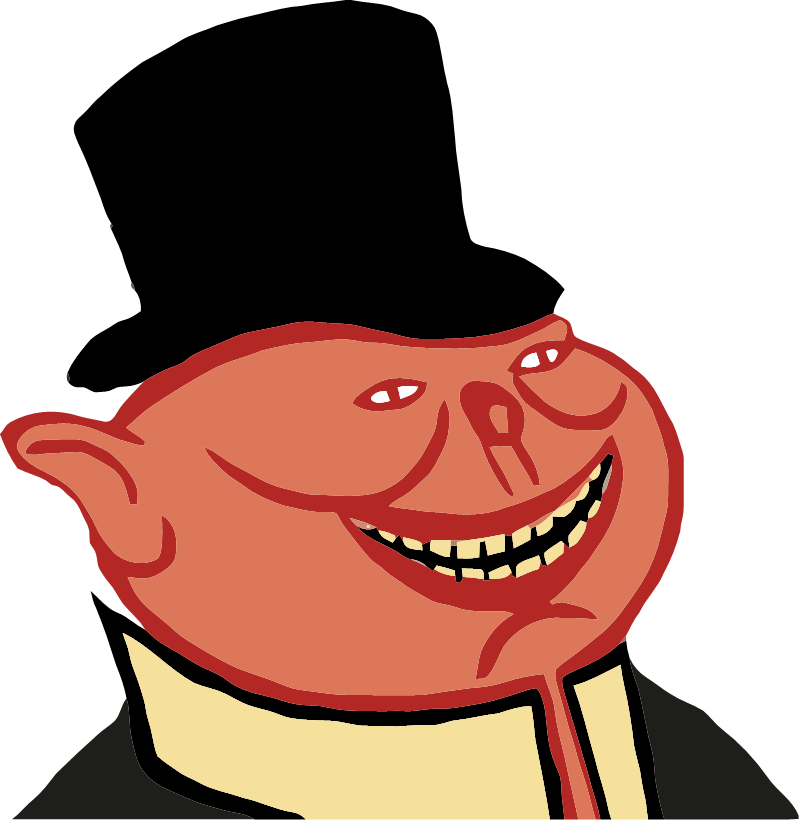
This is what happens when people figure out their "representatives" only represent the ruling class.
One problem in the US is that the purpose of the House of Representatives has been completely subverted. It was supposed to scale up with the population so the representatives really would be part of the community they represent. But we stopped increasing the number of representatives and that lets the ruling elite control them better. The representatives no longer come from their community and the wealthy have less candidates they have to prop up. And the lower count means that gerrymandering is far more effective.
The main problem though is that the US government was built intentionally and from the ground up around representing wealthy landowners. The entire system was never meant to represent the common person and it never will.
Exactly. It wouldn't matter how many representives you add if the while system is designed for and by the oppressors
Well yeah, bourgeois "democracy" is only really democratic for capitalists and not workers.
A lot of people are saying that bourgeois democracy is the dictatorship of the bourgeoisie.
BBC, 2014: Study: US is an oligarchy, not a democracy
The US is dominated by a rich and powerful elite.
So concludes a recent study by Princeton University Prof Martin Gilens and Northwestern University Prof Benjamin I Page.
This is not news, you say.
Perhaps, but the two professors have conducted exhaustive research to try to present data-driven support for this conclusion. Here's how they explain it:
Multivariate analysis indicates that economic elites and organised groups representing business interests have substantial independent impacts on US government policy, while average citizens and mass-based interest groups have little or no independent influence.
Yes, and that's good. How's your aristocratic pseudo-democracy, authored by elites (possibly slavers, depending on your country) who feared real democracy and passed down your present system, doing for you and the world?
Like, do you really look at how there's massive popular consensus to fight climate change, have better healthcare systems, stop genocidal wars, all of which your aristocratic politicians ignore, and then say "We need less democracy because muh mob rule"??

The capitalist class, Walter Lippmann, the Council on Foreign Relations, and the Trilateral Commission’s The Crisis of Democracy would be proud (emphasis mine):
Al Smith once remarked that "the only cure for the evils of democracy is more democracy." Our analysis suggests that applying that cure at the present time could well be adding fuel to the flames. Instead, some of the problems of governance in the United States today stem from an excess of democracy […] Needed, instead, is a greater degree of moderation in democracy.
Game theory would like a word.
Considering the smallest non-fragmented group has resulted in the current 2-party system in most western countries, and results in tribalistic xenophobia, I'm quite content stating democracy is not the egalitarianism it is purported to be.
And I quite resent the insinuation I'm a lapdog.
You are a lapdog if you think those are elements of a democracy, not an oligarchy purporting to be a "representative" democracy.
It’s still the best way even if it’s bad. Ranked choice voting would make it better.
It's demonstrably not, but westerners just keep clinging to their failed system lacking the courage and imagination to try anything different.
What definition of proletarian democracy? It’s not well defined and means vastly different things to different people.
Democracy in which the bourgeoisie are denied political agency as class relations are in the process of being dissolved. The problem isn't actually democracy, the problem is that in a dictatorship of the bourgeoisie (democracy where capitalists are in control) capitalist interests override democracy.
Not that democracy doesn't have problems inherently, but they're pretty minor compared to the problems we are facing.
But the alternatives that people are proposing leaves people with no representation at all. You can’t have representation when you aren’t even allowed to discuss ideas that the government already disagrees with.
The people of China and Vietnam have vibrant discussions of ideas, and they democratically steer their governments. Their voices have more effect on their states than ours here at home. There isn’t a ban on Winnie-the-Pooh in China, and the people are generally vastly better informed on the 1989 Tian’anmen Square riots than we are.
- The Tian’anmen Square ‘Massacre’: The West’s Most Persuasive, Most Pervasive Lie.
- 1989 Tian'anmen Square riots
- A Note on the Tiananmen Protests
- Images from Tiananmen 1989 the West never shows (NSFW / CW: violence and death)
- Tank Man video footage. Tiananmen Square, Beijing, 1989
.
You seem to have uncritically accepted every single thing you’ve been told, which, to be fair, I largely had as well, until I witnessed in real time how obviously fabricated the justification for the Iraq War was, and how seemingly credulously the media propagated it. It took me the last 20 years of investigation to dig myself out from under a lifetime of imperial core propaganda."Not allowed to discuss ideas the governments disagree with" in a myth, a fairy tale told by the kind of people who get banned from everywhere they go for "just having different opinions."
What are the opinions? What are the ideas? The US Civil War, by these terms, could be boiled down to "a clash over different ideas", it's not a useful metric. The fact is, no government on Earth is going to let you actively advocate for their violent overthrow, especially not when theyve just clawed their independence from, in many cases, centuries of colonial rule. And when you actually look into the historical events that anticommunists gesture vaguely at as examples of "communist authoritarianism", that's what it always turns out to be. The cycle goes like this:
Western capital foments fascism--> western capital arms fascists---> western capital directs fascists against socialist state, attempts to topple government for sweet natural resources-->socialist state cracks down on fascism--western capitalist press goes into overdrive about the plight of the poor fascists-->"Actually socialism is as bad as fascism, haven't you read this article in the Bezos Post?"
What are you even talking about? Communism is democratic
A brutal crackdown on the ability of the bourgeoisie to influence elections, buy politicians, and hold office, such that liberals will crow about "human rights" and "freedom" being violated. We can draw fine distinctions between different systems, but fundamentally they still fall on the same side of the fence.
That’s not a political system at all. It’s a process that could be implemented in many styles of government. It is not incompatible with representative democracy either. It is a bad idea though. It means that a government has a hard time changing course, even when it needs to. Because it silences people from questioning decisions.
It's literally how communist states are organized, how is it not a political system?
It’s it though. It’s a principle applied to Chinese communism. It’s not a required part of communism and it isn’t form of government on its own. It’s not even the most major part of a government system.
It's not required for communism per se, but it's certainly a form of government organization. It's how the People's Congress works?
It seems this person is just going to keep repeating that it isn’t a form of government no matter what.
At this point the onus is on @pulaskiwasright@lemmy.ml to specify what criteria need be met for something to be considered “a form of government.”
I'm not holding my breath on a lib getting into specifics
It doesn’t define how leaders are chosen or how laws are enacted. It can’t be a system of government. Unless you have selected a specific implementation of government that uses it and are conflating the term with that government system. If that’s the case, then I agree that arguing over the definition is pointless. So what implementation or design do you think is better.
The current government structures of Cuba, China, Laos, and Vietnam aren’t a secret, nor is the Soviet Union’s. From a declassified CIA document (PDF):
Even in Stalin's time there was collective leadership. The Western idea of a dictator within the Communist setup is exaggerated. Misunderstandings on that subject are caused by lack of comprehension of the real nature and organization of the Communist power structure. Stalin, although holding wide powers, was merely the captain of a team and it seems obvious that Khrushchev will be the new captain.
Almost any other kind of democracy. Representative democracy is better than fascism but it is the worst form of democracy
Everything else people have mentioned in the comments. Proletarian democracy, democratic centralism, participatory democracy, etc.
Well, the first two are really just a way of saying socialism.
Democratic centrism is more of a rule or process or principle. It isn’t even a form of government and it’s compatible with many forms of government.
Proletarian democracy isn’t well defined so I can’t say anything since it means 1000 different things to 1000 different people and often does include representative democracy.
Participatory democracy similarly is a spectrum and is compatible with representative democracy.
So to actually talk about this you would need to be more specific about how the “better” form of government would work.
Name one. One actually concrete form of democracy that would work better.
How do you define "working"? Otherwise I don't know how you're measuring it. Would you say that a system that allows for literally one of the most unpopular genocides in history is "working"? Or a system that is working overtime to increase income and wealth disparity rather than reduce it? Is that working? I certainly wouldn't but I'm guessing you think that's working swell
Even the US State Department dropped the made-up Uighur genocide. When will you dumbass libs get it
Whatever its called that cuba does where national representation is organized and chosen at the local level. Idk im not a political scientist.
But also name ten that are worse
Bu what metric does that system work though? It’s hard to judge it because the info is all unreliable and the government doesn’t share data. We don’t know how bad or good wealth inequality is there.
Is that because of bourgeois representative democracy, or because of the imperialist exploitation of the global south?
Ranked choice voting
Libs are constantly going on about this. A different voting scheme isn't going to solve the real proplem which is that the oppressor class controls the government and not the people. It'll just be a new way of having the illusion of choice to allow people to pretend the US is a democracy










